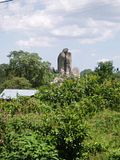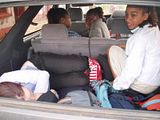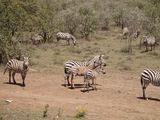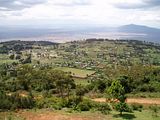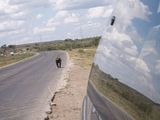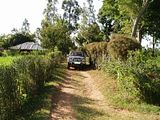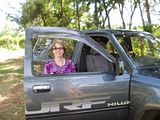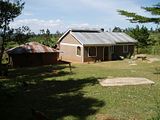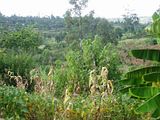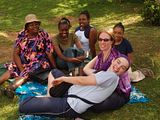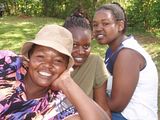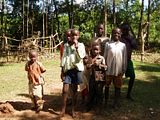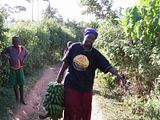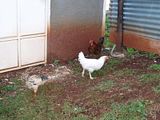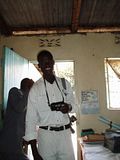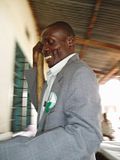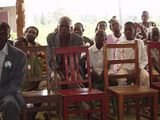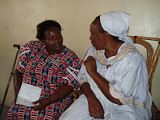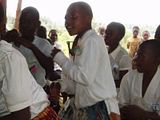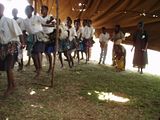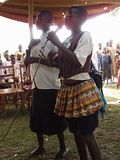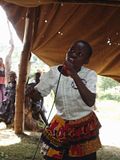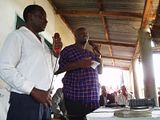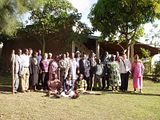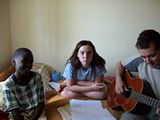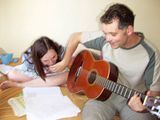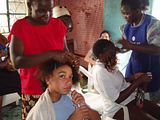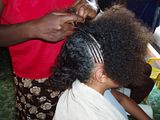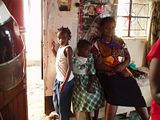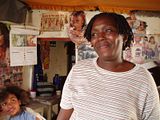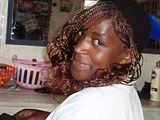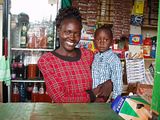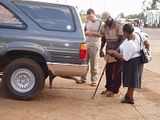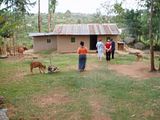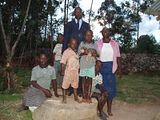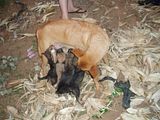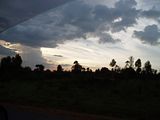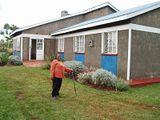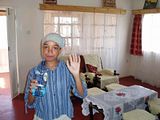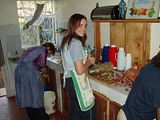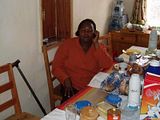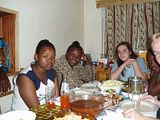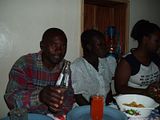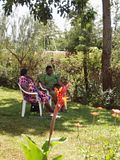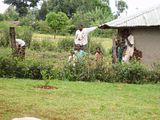Up to Kakamega on Tuesday (an hour north), with a list of last-minute chores to do on the way: charging batteries, ordering a land-line for Naomy's house, buying phone cards... We passed the crying stone of somewhere-or-other, a small boulder perched on a huge stone column, from which water continually and enigmatically seeps. Banking and internet catching-up to be done when we got there, then restaurant food for the first time in a week and home, dropping off on the way a headmaster friend of Naomy's who assured us that the drive to Nairobi would only take three-and-a-half hours in a car. Ha!
We left for Mombassa around six Wednesday morning as the sky began to lighten, and it took seven hours to reach Nairobi, excluding our breakfast break just past Nakuru. We found chips and soda in Nairobi, while Naomy found her insurance documents and her old friend Julius - then off on a hopeless quest to reach Voi by nightfall. Defeated by bumpy roads, we pulled over at the Ali-Sam Guest House in Emali, to be welcomed by hot foam mattresses, many flies, and a two-hour wait for tough-as-old-boots roast goat.
Setting out early this morning, however, we were glad we'd stopped where we did, as the road was being rebuilt and the crazy matatus, enormous juggernauts and us had to share a terrible make-do farm track of a road for about 100km to Mtito Andei. Here, more flies shared our breakfast, though the trinket sellers had some bargains for us! I took over driving, just as we reached the best Kenyan roads we've driven on - I had the same luck yesterday. So we whizzed through Tsavo and Voi and on toward Mombassa, stopping only to photograph passing zebra and baboons, and the odd baobab tree. This is how you'd expect the main supply road into Africa from the huge port of Mombassa to be - and how it might all be if Kenya had a little less corruption and a little less debt. But all good things must end, and the last hour or two to Mombassa we hit the worst roads we'd seen, with the verges often better going than the carriageway.
Mombassa at two in the afternoon is hot, but Hemstrong (chair of the Bunyore Welfare Association of Mombassa, mysteriously important guest at the Harambee in Bunyore last weekend) had invited Naomy to call in - so we waited, melting, for an hour, while he rang every fifteen minutes to tell us he'd be there any time now. Finally he arrived, and took us literally round the corner to his house and a cool-ish soda. As well as the soda, our 90 minutes with him gained us a good introduction to the Lion King game his sons were playing on their PS2, instructions to get to Watamu ("only 45 minutes away"), some vaguely worded support for Naomy's work in the future, and an explanation for his mysterious popularity with the local Bunyore politicians: Naomy asked about his political ambitions and he explained he was merely interested in serving the community, and couldn't really say whether or not he'd be interested in standing as an MP ...
So onward, ever onward to Watamu - which had somehow moved a further hour up the coast, and where we were warmly welcomed by Miranda, Swiss-German wife of a Massai whose family own the Malob Guesthouse: pretty much the cheapest place in town. She showed us the beach, helped us sort out Naomy with an accessible bathroom, and pointed us to the cheap and tasty-enough Roasters restaurant. And, after a 1000 km drive, we went to bed.
- Mark